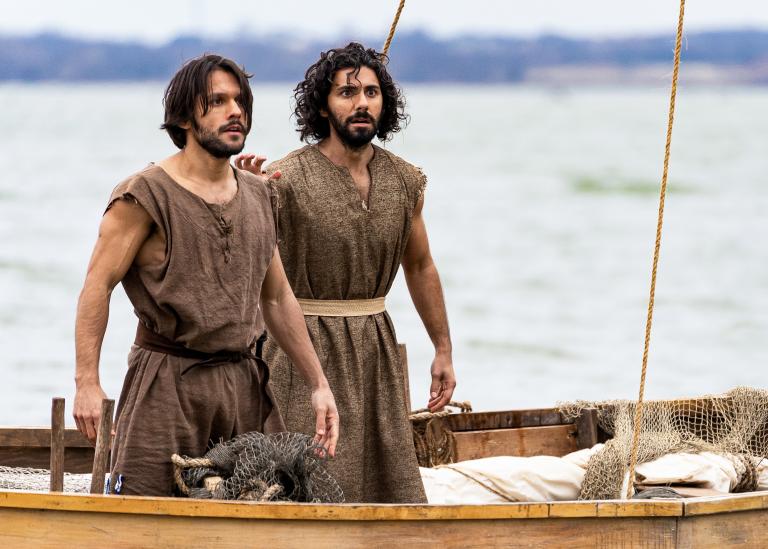In The Atlantic’s June 2021 article, “Christian America’s Must-See TV Show,” Chris DeVille addresses the professional and popular success of “The Chosen,” a multi-season dramatic television series about the life of Jesus. DeVille points out that the show is surprisingly compelling, has won numerous accolades, has a tremendous following (millions, in 50 different languages), and is crowdfunded as it goes.
He also concludes with this rather wistful statement: “If The Chosen represents the next phase of Christian television, that future might include crisp production and nuanced storytelling. But it also seems familiarly destined to remain lodged within one of popular media’s oldest echo chambers.”
DeVille’s main point is that “The Chosen” has become widely recognized as a production of excellence by any secular standard. It’s well-written, well-directed, and well-acted. It’s not cheesy or smarmy; it’s not edgy or politically correct; it’s not one-dimensional or static or preachy. It’s a fully developed imagination of the gospels as they present the life of Jesus, his friends and disciples, his teachings, and his miracles. It’s appealing and visionary. It’s also watched almost exclusively by a Christian audience.
[Not that all Christians love it. By no means. We’re experts at sniping at one another’s attempts to proclaim the name of Jesus. Some Christian complaints focus on non-biblical additions, like the portrayal of Matthew as a man on the autism spectrum. Some complaints center on the fleshing out of the disciples’ personal lives. Perhaps, though, the actual consideration that each of them had a backstory—because they’re humans—is itself a biblical reflection. These objections are likely coming from the same people who liked “Ben-Hur” or “The Ten Commandments.”
One critic writes this: “The writers obviously take a lot of liberties with the story of Jesus, the disciples, and other biblical characters to create a multi-season series. You might think it’s not a big deal; that it’s just entertainment. But this show adds details, attributes, and circumstances that aren’t in the Bible to Bible characters and Bible stories. Don’t you think that those things might paint an inaccurate picture that will affect the way you read God’s Word?” Christian writers and artists have spent 2000 years imagining the dimensions and emotions and relationships that the real people of the Bible experienced though the Bible says nothing about them. These stories do not live in a theological vacuum, and yes, of course they will affect the way we read God’s Word. They have the power to help us enter into its reality, its incarnational vitality. No one is suggesting that Michelangelo’s Sistine paintings are inspired the way that the Gospels are inspired, but most recognize that they kindle within the soul a deeper reflection on the real truth of the Gospel. But I digress…]
So what’s the disconnect with a secular audience? Why hasn’t it “crossed over” as have other Christian artists with a Christian message? We can speculate.
Perhaps secular viewers pass over it because it’s not “contemporized.” The settings and costumes all replicate first-century biblical Palestine. There’s no attempt to make the story 21st-century, and “period pieces” are pretty much slotted into these categories: medieval(ish) (“The Last Kingdom,” “Game of Thrones”), revolutionary (“Turn,” “Poldark”), Victorian, and early 20th-century. We haven’t really as a culture gotten hooked on first-century Palestine since Charlton Heston.
Perhaps secular viewers pass over it because it hasn’t been Netflixed or Primed or Hulued. After all, we’re people of ruts, and we surf the apps we’ve paid for, perhaps simply assuming if it was genuinely good, it would be on a central viewing portal.
Perhaps secular viewers pass over it because they’re absolutely terrified of being evangelized. This needs very little explanation. No one wants to be solicited for money, religion, or politics in their entertainment worlds (or anywhere else for that matter) unless they’re already invested, believing, or convinced.
Perhaps, though, it’s all about Jesus. One way or the other.
Pick one: The Jesus story is a) an overdone trope of religious, pietistical, and political agendas for the last 2000 years; b) a good story that’s just been told one too many times, been there done that; c) a never-ending source of delight and wonder and curiosity. Jesus makes you weep with longing or yawn with boredom.
Despite our Christian calling to be a witness to the “good news” of God’s saving actions in Jesus Christ, most nonbelievers just don’t care about Jesus. Incarnation? God in the flesh? Yeah, okay, you’d first have to believe in God for that to matter. Miracles? Healing? Two thousand years ago. Crucifixion? A lot of good people, innocent people, have been martyred. Resurrection? Yawn. Phil Coulson from the Marvel Universe was resurrected too.
What now is the “good news”? And how do we share it with people who don’t know they need any good news? “The Chosen” is witnessing to the Gospel, and we can hope that some of its resonant glory notes escape from the echo chamber they seem to inhabit. But then again, there’s that Jesus-word about eyes to see and ears to hear and hearts to understand.


 Photo by Vidangel Studios
Photo by Vidangel Studios










